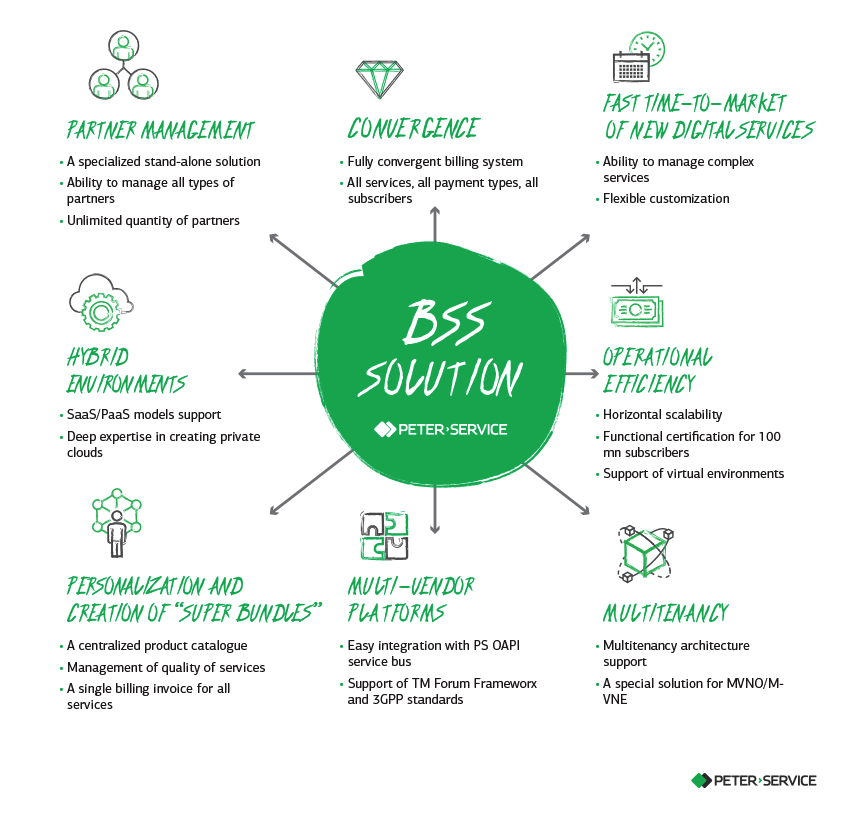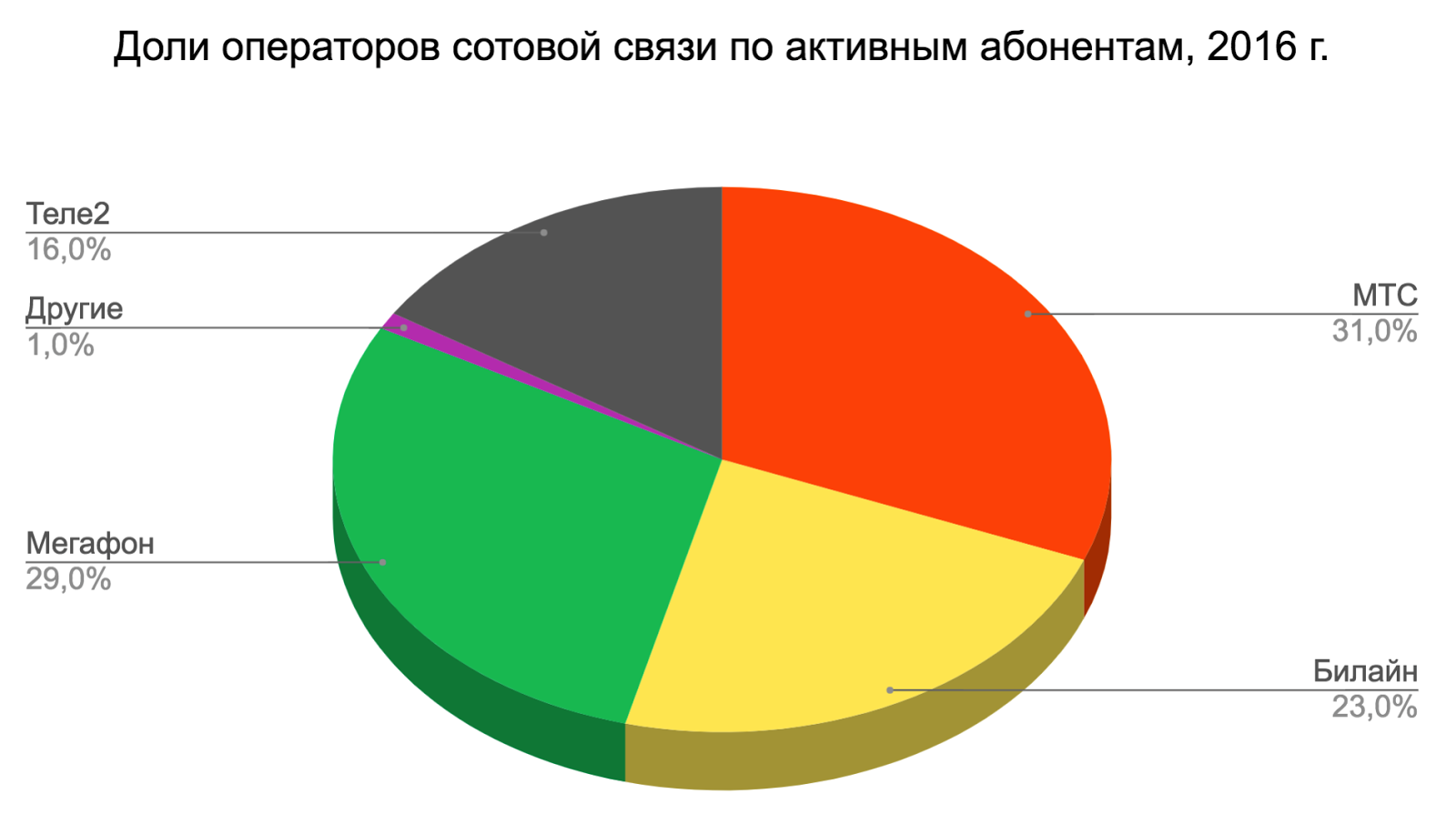The future billing systems and how they change the communications market
Cellular operators for several years are at a crossroads. Voice and SMS services are quickly becoming obsolete. Traditional business is losing profitability. The main goal was the search for new products and services that will help stay on the cutting edge of progress and business. Operators give up the name "mobile provider" and come to the proud "digital service provider" or even "lifestyle enabler." Analysts write that this is one of the manifestations of global processes that are characteristic of many sectors of the economy. We will come to this from the applied side and explain why telecom has it all so briskly and what will happen ahead.

At the heart of the telecom operator's activity is the BSS (Business Support System) - a comprehensive solution for business business processes, the software heart of the carrier business. Among the tasks of the BSS is to recognize, charge, calculate a client, provide services to him, issue an invoice, accept payment and make it so that everyone is pleased. Even this list already looks impressive. And now, with the development of the BSS carrier business, they are continuously becoming more complex and taking on new tasks. Once they were sending service SMS and the formation of permissible negative limits, and now, for example, advanced advicing, prompts of new tariffs, individual offers of new services.
In this case, from an engineering point of view, systems tend to be simplified. Operators are interested in the fact that the cost of supporting a BSS does not grow as fast as its functionality. In an ideal picture of the world, the vendor offers the operator maximum functionality with minimal complexity of the solution. Good BSSs give the operator the opportunity to reduce operating costs, prevent the sacralization of personnel, easily change individual functional units and increase business opportunities with the help of upgrades.
')

According to the consulting company J'son & Partners Consulting
And most importantly, they allow you to quickly respond to the actions of competitors and bring new comprehensive services to the market. By renting a BSS, a bank or a large online trading platform can enter the market as a virtual operator (MVNO) without significant costs at any time and entice the audience from old players.
What should be BSS-systems to meet all the needs of operators today? Let's imagine the stage of development that they are going through at the moment.
So, recently the telecom industry has been actively developing, new technologies are emerging, marketers are bringing new offers to the market, partners are offering joint promotion. Further the fork is the following: if the BSS supports a new business, it is developed; if not, it is substantially altered or completely replaced. So everything looks ideally.
Now go down to the ground. Are there many happy and carefree telecom operators? They are constantly in motion - mergers, acquisitions, periods of explosive growth, the slowdown of this growth, the development of new directions. On such a systematic and in-depth development of the BSS in such conditions there are no resources left. As a result, a whole baggage of problems is collected: difficult integration, excess NSI, functional failures and a large number of custom code.
What does the operator want to get after all these shocks? Comprehensive platform on which you can quickly build end-to-end processes. The transformation of classic billing systems into digital platforms has been talked about for many years, and now the requirements are starting to take shape. First of all, there is convergence, horizontal scalability, support for cloud and hybrid deployment models among the MUST HAVES. The requirements for “fronts” stand in a separate block: it is vital for the operator to communicate with his client wherever he is — in social networks, via SMS, via instant messengers, personal account, mobile app, etc.
Among the important business requirements are also the possibility of creating superbands and close integration with partner platforms. Partners are just as important for the operator as the customers are - they form the operator's assortment ecosystem and give him an additional opportunity to earn. Finally, the most important requirement for BSS is an improvement in the TTM (time-to-market) indicator.
All this should be assembled into a transparent, easily integrable and configurable “box” that will allow the operator to adapt to actively changing business requirements while maintaining a low TCO.
The needs of the operators are clear, but there is a disagreement with the technical implementation of the BSS. The main one is the question of the “absolute catalog”. On account of whether the catalog should be absolute, there is no consensus among vendors and operators. For now, a multi-level system of directories and quasi-directories looks preferable:
Is it possible to merge these directories into one super directory? Theoretically yes. But will this lead to significant improvements?

Solving the problem of directories, you need to take into account many questions. The most difficult of them are the issues of bundling. They are solved with the help of a large pool of rules on the availability and assignment of products, promotions, partner and complex services to the subscriber, as well as special pricing when recruiting bundles. For example, the operator sells a smartphone at a price of 10 thousand rubles. And separately - a tariff plan for 1 thousand rubles a month. Having bought together a smartphone and a tariff, the buyer will pay 9 thousand and for three months he will receive a 5 GB traffic package as a gift. And if you buy wireless headphones for 5 thousand, you will get a beautiful ball. And last month, the operator for the headphones gave a pot without honey. And the next will give, say, a scow full of mullet. It does not matter that - it is important that the rules are applied automatically, at a specified time and according to the standard algorithm of interaction with the OMS and the accrual module . With this important functionality, the catalog becomes the main tool in the abbreviation of TTM. So, having solved the question of the ideal catalog, the vendor solves the main task of the operator.
What will determine the development of BSS in the near future? The client himself. And from the technical side - various technologies for collecting and analyzing data about it. Here is the place for such sensational things as big data, machine learning, IoT. The BSS will not be able to passively hide behind the maintenance of a traditional connection. Without broad analytical and predictive possibilities for personalization, the system will not be able to serve the operator’s digital tasks.

Working with personal preferences of clients will lead to the distribution of individual proposals on the structure of bundles and prices. Then the global era of cross-selling will begin — amazing by today's standards of campaigns. For example, the operator, Russian Railways and the content provider will make a joint action for passengers of the Peregrine Falcons and other high-speed trains. Or it turns out that a person for 10 years has been both a subscriber of the operator and a client of Perekrestok. On this anniversary, a present was presented on a joint loyalty program: for the young men - the supercode for the World of Tanks from the operator, for the girls - the cookery book by Jamie Oliver from the hypermarket.
Exit to the official space of remote health care systems will certainly pamper us with bright campaigns of operators and clinics such as “Check your back - get an invite to telemedicine!”. Insurance, banking, entertainment services will also be connected here - in short, everything that will allow the telecom operator to be called lifestyle enabler.
BSS, which grew out of the simplest billing, is expanding in all directions, following the market and often anticipating it. It will reflect all the significant stages of progress - digitalization, IoT'zatsiya, 5G ... Sooner or later, telecom developers will not just create billing systems, but be responsible for the back-end of a huge chunk of the consumer market.
Materials for publication were provided by the chief analyst of Peter-Service, Tatyana Atanova, and the chief system architect of corporate solutions, Alexey Semenyuta.

At the heart of the telecom operator's activity is the BSS (Business Support System) - a comprehensive solution for business business processes, the software heart of the carrier business. Among the tasks of the BSS is to recognize, charge, calculate a client, provide services to him, issue an invoice, accept payment and make it so that everyone is pleased. Even this list already looks impressive. And now, with the development of the BSS carrier business, they are continuously becoming more complex and taking on new tasks. Once they were sending service SMS and the formation of permissible negative limits, and now, for example, advanced advicing, prompts of new tariffs, individual offers of new services.
In this case, from an engineering point of view, systems tend to be simplified. Operators are interested in the fact that the cost of supporting a BSS does not grow as fast as its functionality. In an ideal picture of the world, the vendor offers the operator maximum functionality with minimal complexity of the solution. Good BSSs give the operator the opportunity to reduce operating costs, prevent the sacralization of personnel, easily change individual functional units and increase business opportunities with the help of upgrades.
')

According to the consulting company J'son & Partners Consulting
And most importantly, they allow you to quickly respond to the actions of competitors and bring new comprehensive services to the market. By renting a BSS, a bank or a large online trading platform can enter the market as a virtual operator (MVNO) without significant costs at any time and entice the audience from old players.
BSS systems and digital transformation
What should be BSS-systems to meet all the needs of operators today? Let's imagine the stage of development that they are going through at the moment.
So, recently the telecom industry has been actively developing, new technologies are emerging, marketers are bringing new offers to the market, partners are offering joint promotion. Further the fork is the following: if the BSS supports a new business, it is developed; if not, it is substantially altered or completely replaced. So everything looks ideally.
Now go down to the ground. Are there many happy and carefree telecom operators? They are constantly in motion - mergers, acquisitions, periods of explosive growth, the slowdown of this growth, the development of new directions. On such a systematic and in-depth development of the BSS in such conditions there are no resources left. As a result, a whole baggage of problems is collected: difficult integration, excess NSI, functional failures and a large number of custom code.
What does the operator want to get after all these shocks? Comprehensive platform on which you can quickly build end-to-end processes. The transformation of classic billing systems into digital platforms has been talked about for many years, and now the requirements are starting to take shape. First of all, there is convergence, horizontal scalability, support for cloud and hybrid deployment models among the MUST HAVES. The requirements for “fronts” stand in a separate block: it is vital for the operator to communicate with his client wherever he is — in social networks, via SMS, via instant messengers, personal account, mobile app, etc.
Among the important business requirements are also the possibility of creating superbands and close integration with partner platforms. Partners are just as important for the operator as the customers are - they form the operator's assortment ecosystem and give him an additional opportunity to earn. Finally, the most important requirement for BSS is an improvement in the TTM (time-to-market) indicator.
All this should be assembled into a transparent, easily integrable and configurable “box” that will allow the operator to adapt to actively changing business requirements while maintaining a low TCO.
Developers view
The needs of the operators are clear, but there is a disagreement with the technical implementation of the BSS. The main one is the question of the “absolute catalog”. On account of whether the catalog should be absolute, there is no consensus among vendors and operators. For now, a multi-level system of directories and quasi-directories looks preferable:
- technical, in conjunction with the contour of charges and billing,
- catalog in the ordering structure,
- commodity, working in the e-commerce layer with access to retail sites and marketplaces.
Is it possible to merge these directories into one super directory? Theoretically yes. But will this lead to significant improvements?

Solving the problem of directories, you need to take into account many questions. The most difficult of them are the issues of bundling. They are solved with the help of a large pool of rules on the availability and assignment of products, promotions, partner and complex services to the subscriber, as well as special pricing when recruiting bundles. For example, the operator sells a smartphone at a price of 10 thousand rubles. And separately - a tariff plan for 1 thousand rubles a month. Having bought together a smartphone and a tariff, the buyer will pay 9 thousand and for three months he will receive a 5 GB traffic package as a gift. And if you buy wireless headphones for 5 thousand, you will get a beautiful ball. And last month, the operator for the headphones gave a pot without honey. And the next will give, say, a scow full of mullet. It does not matter that - it is important that the rules are applied automatically, at a specified time and according to the standard algorithm of interaction with the OMS and the accrual module . With this important functionality, the catalog becomes the main tool in the abbreviation of TTM. So, having solved the question of the ideal catalog, the vendor solves the main task of the operator.
Future bss
What will determine the development of BSS in the near future? The client himself. And from the technical side - various technologies for collecting and analyzing data about it. Here is the place for such sensational things as big data, machine learning, IoT. The BSS will not be able to passively hide behind the maintenance of a traditional connection. Without broad analytical and predictive possibilities for personalization, the system will not be able to serve the operator’s digital tasks.

Working with personal preferences of clients will lead to the distribution of individual proposals on the structure of bundles and prices. Then the global era of cross-selling will begin — amazing by today's standards of campaigns. For example, the operator, Russian Railways and the content provider will make a joint action for passengers of the Peregrine Falcons and other high-speed trains. Or it turns out that a person for 10 years has been both a subscriber of the operator and a client of Perekrestok. On this anniversary, a present was presented on a joint loyalty program: for the young men - the supercode for the World of Tanks from the operator, for the girls - the cookery book by Jamie Oliver from the hypermarket.
Exit to the official space of remote health care systems will certainly pamper us with bright campaigns of operators and clinics such as “Check your back - get an invite to telemedicine!”. Insurance, banking, entertainment services will also be connected here - in short, everything that will allow the telecom operator to be called lifestyle enabler.
BSS, which grew out of the simplest billing, is expanding in all directions, following the market and often anticipating it. It will reflect all the significant stages of progress - digitalization, IoT'zatsiya, 5G ... Sooner or later, telecom developers will not just create billing systems, but be responsible for the back-end of a huge chunk of the consumer market.
Materials for publication were provided by the chief analyst of Peter-Service, Tatyana Atanova, and the chief system architect of corporate solutions, Alexey Semenyuta.
Source: https://habr.com/ru/post/344236/
All Articles